Sea level rise will accelerate even if warming limited to 1.5°C, study warns
A team of climate scientists has reached an alarming conclusion: even if humanity manages to limit global warming to 1.5°C above pre-industrial levels, as outlined in the Paris Agreement, this will not stop accelerated ice melting and sea level rise, Kazinform News Agency correspondent reports.

The study, published in Communications Earth & Environment journal, shows that current warming of 1.2°C has already triggered irreversible processes in the ice sheets of Greenland and Antarctica.
Scale of the threat
Since the 1990s, ice mass loss has quadrupled and has now become the primary driver of global sea level rise. Between 1992 and 2020, ice sheets contributed 21 millimeters to sea level, with the rate of loss increasing from 105 billion tons per year in the early 1990s to 372 billion tons in 2016-2020.
The Greenland ice sheet is melting particularly rapidly, containing water equivalent to 7.4 meters of sea level rise. The Arctic is warming nearly four times faster than the global average, making this region especially vulnerable.
Scientists studied ancient warming periods to understand glacier behavior. For example, during the Last Interglacial period 125,000 years ago, when temperatures were only 0.5-1.5°C higher than today, sea level was several meters above current levels.
Particularly concerning is that ice sheets can lose stability abruptly - a small temperature increase can trigger a chain reaction of rapid melting that continues for centuries even after climate stabilization.
Future projections
Even under the most optimistic scenario, where temperatures stabilize at 1.4°C by 2100, ice sheets will continue losing mass and raising sea levels by tens of centimeters over the coming centuries.
With 1.5°C of warming, the rate of sea level rise from Antarctic melting could reach 1.5 millimeters per year by 2100, with total contribution exceeding one meter by 2300.
Consequences for humanity
A 20-centimeter sea level rise by 2050 could lead to damage of one trillion dollars annually for just the world's 136 largest coastal cities. About one billion people live at elevations less than 10 meters above sea level, while 230 million live within one meter.
The study's authors warn that keeping ice sheets in a stable state requires not just limiting warming, but actually cooling the planet below current levels - possibly to 1°C above pre-industrial levels or even lower.
Scientists call for urgent development of more precise assessments of a "safe limit" for ice sheets, as current climate targets may prove insufficient to prevent catastrophic changes.
Earlier, Kazinform News Agency reported that summer forecast to be hotter than average.
